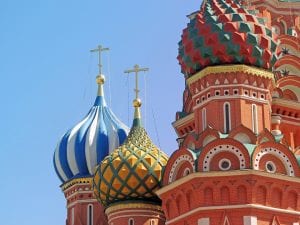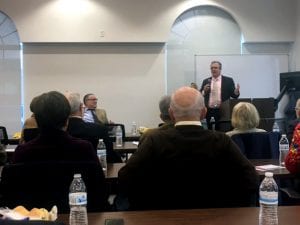
A year later, the intelligence community has no doubt Russia did everything it could to interfere with the 2016 United States presidential election. Andrew Kuchins, senior fellow at the Center for Eurasian, Russian and East European Studies at Georgetown University, visited the SMU Tower Center to explain Russia’s motives and explore how successful its campaign was.
What did Russia hope to gain from its efforts? Russian President Vladimir Putin has hated Hillary Clinton since she was secretary of state under President Obama. From watching Trump on the campaign trail, it was easy to conclude Trump, who went as far as to praise Putin for his strong leadership, would be a softer opponent than Clinton. The Russians wanted to do more than help Donald Trump; they wanted to disrupt. Hackers backed by Russia targeted various election systems, and even though the intelligence community concluded that no votes were affected, Russia had succeeded in their real goal: decreasing Americans’ trust in the democratic process. According to Kuchins, Putin thought even if Clinton won, at least people would question the legitimacy of her election.
US-Russian Relations: A History Lesson

The United States and Russia are fundamentally different in every aspect. The U.S. is a classic sea power, while Russia is a continental power concerned with border security. “Centralized power is in Russian DNA,” Kuchins said. Russia values and promotes stability abroad, while the U.S. has decentralized power and believes in and promotes democracy abroad.
To understand why Russia launched this campaign in the first place, Kuchins went all the way back to the collapse of the Soviet Union in 1991. Overnight Russia was no longer a super power; it was bankrupt, and forced to accept humanitarian aid. Putin still looks back on this as humiliating. The Soviet Union believed if it disbanded, it was implicitly agreed that the U.S. would not take advantage of its geopolitical weakness. The United States, on the other hand, thought a victory in the Cold War would mean a democratic, Westernized Russia. Both sides were unrealistic, Kuchins says, and both were disappointed. This mutual disappointment set the stage for sour contemporary American-Russian relations.
NATO Expands
Kuchins argues several moments gradually led to the ice-cold relations the U.S. now has with the Kremlin. The first, and maybe most notable, was the expansion of NATO in 1999 (Poland, Hungary, and the Czech Republic) and then again under George W. Bush in 2004 (Bulgaria, Estonia, Latvia, Lithuania, Romania, Slovakia and Slovenia). Even though the former Warsaw Pact countries were the ones to initiate and push for NATO membership, Kuchins argued the U.S. underestimated the consequences.
Libya: 2011
Putin was furious with the U.S.’s involvement in Libya and with the death of Muammar el-Qaddafi. In his view, the NATO airstrikes on the convoy of loyalists that eventually led to Qaddafi’s murder violated the UN security council resolutions. Putin saw that Qaddafi gave up his weapons of mass destruction and was then punished for it. He was further infuriated by Secretary of State Hillary Clinton’s nonchalance in regard to the disaster in Libya, as she famously said “We came, we saw, he died!” after Qaddafi’s death was announced. Putin promised he would not let Syria’s President Bashar al-Assad meet the same fate. “Putin drew a red line,” Kuchins said.
Ukraine: 2014
Ukraine holds historic and strategic significance to Russia. In 2014, protesters filled the streets to voice grievances against Ukraine’s pro-Russia Prime Minister Viktor Yanukovych. Yanukovych was overthrown by the uprising and fled to Russia. It looked bad that Putin’s candidate was forced out, and Putin still believes the U.S. was behind the coup. Putin responded by annexing the “least Ukrainian part of Ukraine,” the Crimea, Kuchins said. This move was widely supported by Russians. Kuchins even described it as “cathartic” for them.
All of these turning points, and more, led to today’s state of American-Russian relations. Russia interfered in the election with the hope of gaining a strategic advantage and compromising the United States’ status in the geopolitical sphere.
Did Russia get what it wanted?
According to Kuchins, yes and no. Yes, President Trump won. But, he is unpredictable, which goes against the stability Putin is known to favor. As Kuchins put it, only Putin is allowed to be spontaneous and unpredictable. Yes, the Russians were successful in creating disruption and mistrust in both mainstream media and mainstream politics. However, there was a backlash to the election of Trump in Europe. Kuchins argues French President Emmanuel Macron and German Prime Minister Angela Merkel both would most likely have been less successful if it weren’t for a vehement European rejection of Trumpism and alt-right politics.